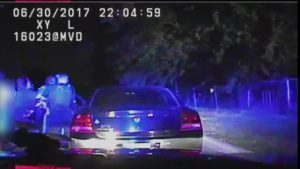Sponsors withdraw bill that would have reduced citizen access to body cam, dashcam footage
The sponsors of legislation that would have reduced citizen access to body cam and dashcam footage decided not to run their bill this year.
 The bill was written as a “caption bill,” meaning it had vague placeholder language intended to be replaced with an amendment. Late last week, advocates interested in police surveillance and access to public records obtained the 10-page amendment under consideration. It was only a few days before the bills would be presented, allowing very little time to weigh in as both the House and Senate started finishing out their calendars.
The bill was written as a “caption bill,” meaning it had vague placeholder language intended to be replaced with an amendment. Late last week, advocates interested in police surveillance and access to public records obtained the 10-page amendment under consideration. It was only a few days before the bills would be presented, allowing very little time to weigh in as both the House and Senate started finishing out their calendars.
The proposed legislation , HB 2586 and SB 1999, came from the office of Rep. Michael Curcio, R-Dickson. While various amendments were being shared, they all essentially added new confidentiality around footage from body cameras and dashcams unless the footage was evidence in a criminal proceeding. The proposal allowed law enforcement to release video, but without citizen access assured by the public records law, some advocates feared that only footage that made officers look good would be released while other footage could be deleted or withheld.
The proposed legislation also permitted law enforcement to delete most body cam footage after 30 days, raising concerns that footage would be destroyed that could later be important in an internal investigation or when accusations arose later about a policy violation, such as excessive use of force. The bill also applied criminal court discovery rules to all body cam and dash cam footage even when there was no criminal proceeding.
Meanwhile, a bill that renews an exemption for certain body camera footage has passed the Senate and is expected to soon go to the House floor. That exemption makes confidential images of minors when taken the video is taken inside a K-12 school; the interior of any facility licensed under the “healing arts” and the “mental health and substance abuse and intellectual and developmental disabilities” parts of the law; and the interior of a private residence that is not being investigated as a crime scene. It was expanded this year to include the interior of day care centers.
That bill is SB 2061 / HB 1957, sponsored by Sen. Jack Johnson, R-Franklin, and Rep. John Gillespie, R-Memphis. Rep. Sam Whitson signed on as a co-sponsor.




